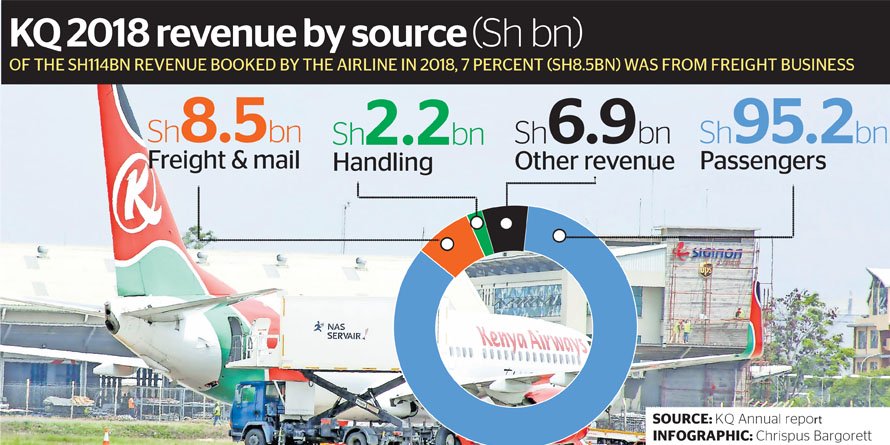Companies
KQ cargo blow after 283 crew stay in quarantine
Thursday, April 16, 2020 7:30
By GERALD ANDAE

Kenya Airways #ticker:KQ has been forced to ground some of its cargo planes due to a shortage of flight staff as the national carrier’s 283 cabin crew remain in mandatory quarantine, costing the firm Sh80 million in occupancy bills.
The Nairobi Securities Exchange-listed carrier has failed to match demand for cargo business at the Jomo Kenyatta International Airport (JKIA) in Nairobi due to lack of crew to operate the planes. Its woes were compounded by the fact that Kenya has struck a deal with Ethiopian Airlines to carry cargo from JKIA to Europe.
This is another blow for the airline in a period when Kenya has frozen international passenger travel in the wake of the global coronavirus pandemic, leaving cargo as the only revenue driver.
The loss-making firm had received regulatory approval to convert some of its 41 passenger planes grounded by the pandemic for shipment of cargo to Europe and Asia.
“The issue right now is how we do as many cargo flights as possible to help us supplement our income. But it will be difficult if we cannot get our crew out of quarantine,” KQ chief executive officer Allan Kilavuka said in an interview with the Business Daily. “We still have 283 in the hotels as at today and it has cost us close to Sh80 million. This is money we should have used for operation and sustainability”.
The State last month cancelled flights and ordered everyone flying into Kenya to undergo a 14-day mandatory quarantine, which in some instances has been extended to 21 days.
Kenya yesterday reported 225 confirmed cases and a total of 10 deaths from the coronavirus. One of the victims was a Kenya Airways pilot.
It is still not clear how many airline staff are among the 225 cases confirmed as positive. Initially, KQ had 400 cabin crew in mandatory quarantine.
Kenya Airways has slightly over 30 planes , mainly passenger aircraft. The carrier is betting on cargo shipment via the passenger planes, especially for long haul, amid a rise in demand for freight, notably to Europe.
“We do not have a lot of cargo within Africa and we would like to do long haul to other parts of the world,” said Mr Kilavuka.

Freight charges are rising on the back of an increase in demand for aircraft space. Most cargo airlines have reduced their flights following the outbreak of Coronavirus, which has infected over two million people across the world.
European leaders had from early March sealed off their borders for at least 30 days in response to the outbreak. Some countries like Spain, Denmark, Italy and Austria from Monday started to ease their tough restrictions that had kept people confined in their homes for more than a month and restricted movement of goods across borders and continents.
Countries like Kenya also imposed restrictions on air travel with cargo carriers being exempted. The country, however, suspended all cross-border passenger flights on March 22, stopping KQ’s foreign flights. The order effectively cut off Kenya Airways’ flow of new revenues at a time when it had no cash reserves.
The global aviation trend has created a gap in cargo transport despite high volumes of freight needed for the European market where Kenya sells more than 80 percent of its horticulture produce. Exporters say demand for freight space for floriculture, vegetables and fruits has increased to 3,500 tonnes against cut capacity of 1,300 tonnes per week.
Operators have more than doubled the cost of flying a kilo of produce to between $4.5 and $7 from a range of $1.3 and $3.3 a kilo in January, making the market attractive for operators like Kenya Airways.
The carrier deployed a Dreamliner passenger aircraft to Johannesburg, South Africa, on Sunday, where it ferried medical supplies.
“As we do things differently, we know that it is critical for essential goods to be transported. Some of our grounded passenger planes will complement the work of our cargo freighters in this way,” said the carrier on its social media page.
So far, the airline has sought a multi-billion shilling government bailout after grounding its planes.
Without State aid, the airline risks running out of money in the near future against the background of banks’ uneasiness in lending to Africa carriers.
KQ’s problems have been linked to a mix of increased competition, corruption, mismanagement and a previous debt binge that continues to weigh heavily on its balance sheet.
Credit: Source link